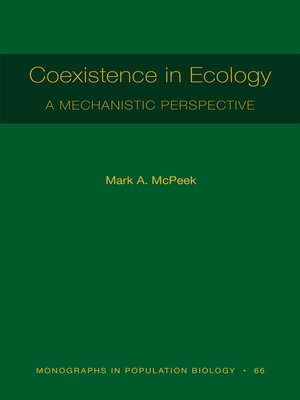Coexistence in Ecology
ebook ∣ A Mechanistic Perspective · Monographs in Population Biology
By Mark A. McPeek

Sign up to save your library
With an OverDrive account, you can save your favorite libraries for at-a-glance information about availability. Find out more about OverDrive accounts.
Find this title in Libby, the library reading app by OverDrive.



Search for a digital library with this title
Title found at these libraries:
| Loading... |
A comprehensive framework for understanding species coexistence
Coexistence is the central concept in community ecology, but an understanding of this concept requires that we study the actual mechanisms of species interactions. Coexistence in Ecology examines the major features of these mechanisms for species that coexist at different positions in complex food webs, and derives empirical tests from model predictions.
Exploring the various challenges species face, Mark McPeek systematically builds a model food web, beginning with an ecosystem devoid of life and then adding one species at a time. With the introduction of each new species, he evaluates the properties it must possess to invade a community and quantifies the changes in the abundances of other species that result from a successful invasion. McPeek continues this process until he achieves a multitrophic level food web with many species coexisting at each trophic level, from omnivores, mutualists, and pathogens to herbivores, carnivores, and basic plants. He then describes the observational and experimental empirical studies that can test the theoretical predictions resulting from the model analyses.
Synthesizing decades of theoretical research in community ecology, Coexistence in Ecology offers new perspectives on how to develop an empirical program of study rooted in the natural histories of species and the mechanisms by which they actually interact with one another.






